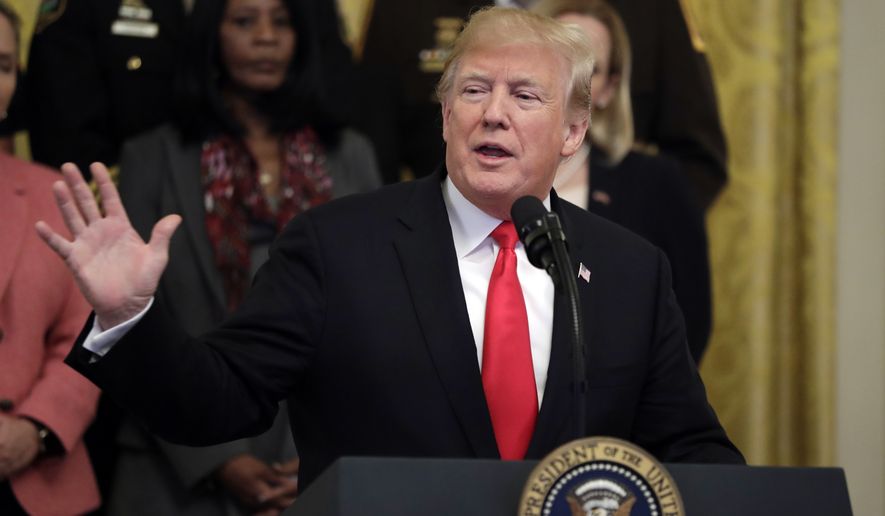President Trump signed a mammoth opioids bill Wednesday designed to expand treatment options, fund non-addictive painkillers and stop the flow of deadly synthetic drugs from abroad, saying the bipartisan effort will combine with his own efforts put a “big dent” in the problem.
A bipartisan effort, the bill cleared both chambers by wide margins this fall, providing a respite from partisan bickering over the Supreme Court and the midterm elections.
The president told addiction survivors, law enforcement officials and other White House guests the bill capped “historic” steps he has taken in the last year to rein in the drug-overdose epidemic, which killed a record 70,000 people in 2017.
He cited indictments of Chinese nationals suspected of trafficking fentanyl, the creation of a Just Say No-style campaign against opioid use and a crackdown on doctors who wrote fraudulent opioid prescriptions for opioids.
Officials from a series of companies, from Amazon to Facebook, shook hands with Mr. Trump while a narrator listed their efforts to combat addiction in the private sector.
“You won’t see the results immediately, but you’ll see the results in the future, and very quick future,” Mr. Trump said.
The administration says the drug epidemic is still raging but the rate of the death toll has slowed in recent months, suggesting the nation is turning a corner.
Dozens of lawmakers from both parties contributed to the legislative effort, which lifts a cap on Medicaid funding for drug treatment, extends help to addicted mothers and empowers package inspectors to root out deadly fentanyl from China.
Yet only one Democrat, Sen. Maggie Hassan of New Hampshire, was on hand for the signing, which comes less than two weeks before Election Day.
Some Democrats say Mr. Trump and congressional Republicans are undermining the overall fight even as they make incremental progress against addiction.
“It is disingenuous at best to promise relief to people struggling with opioid addiction while also attempting to cut funding for Medicaid and eliminate protections for people with pre-existing conditions, which include opioid use disorder,” said Rep. Frank Pallone, New Jersey Democrat.
Senior Republicans said the success of the bill signaled something else — that GOP leaders are delivering results despite the daily rumpus over Mr. Trump’s tweets and partisan feuds over the Supreme Court.
Sen. Lamar Alexander, the Tennessee Republican and health committee chairman who guided the package on his side of the Capitol, said Americans should view today’s Washington as a type of “split-screen television.”
On one side, there’s the hue and cry over Justice Brett M. Kavanaugh’s nomination to the high court, the president’s tweets and cable news-driven acrimony between partisan camps.
“On the other side, during the month between Sept. 6 and Oct. 6, you had a steady stream of major bipartisan accomplishments in Congress — this is the biggest,” Mr. Alexander said, referring to the opioids bill.
Mr. Alexander said he understands why the chaotic moments get more attention — people are interested in the plane that crashes, not the one that lands safely.
Still, “I think people would feel better about their government if they can see the other side of the screen,” he said.
The White House bill-signing offered a look at the sober half of Mr. Alexander’s split-screen, even as Twitter users bickered over reports the police and U.S. Secret Service intercepted pipe bombs sent to CNN’s New York offices and Democratic leaders Wednesday.
Lawmakers applauded a key part of the opioids bill, the STOP Act, that forces the U.S. Postal Service to collect advanced electronic data on packages entering the U.S.
Sen. Rob Portman, Ohio Republican, said his measure will close a “loophole” that has allowed deadly fentanyl to flow into the country from clandestine labs overseas.
Private shippers UPS and FedEx already procure advanced data, which U.S. Customs and Border Protection uses to target suspicious packages.
Under the new bill, all postal packages from China, and 70 percent of the overall flow, must have the information available by the end of this year, with 100 percent global compliance due by 2021.
“This should cut down, almost immediately, the suspicious packages coming in from places like Mexico and China that contain illicit opioids like fentanyl,” said White House counselor Kellyanne Conway.
Officials say fentanyl, a synthetic opioid said to be 50 times more powerful than heroin, is the top killer in the drug-overdose crisis.
• Tom Howell Jr. can be reached at thowell@washingtontimes.com.




Please read our comment policy before commenting.